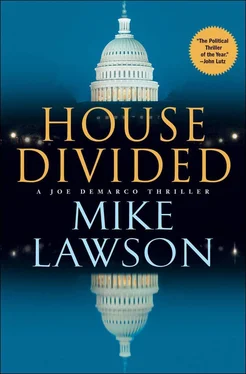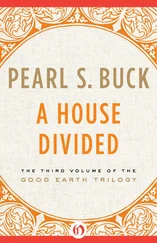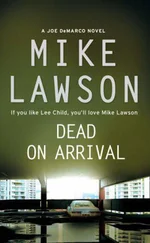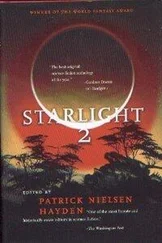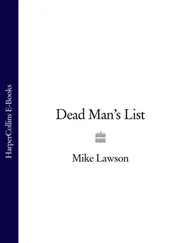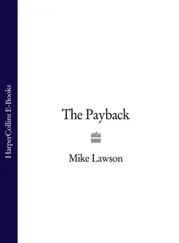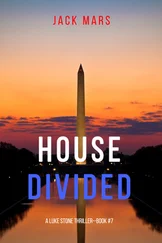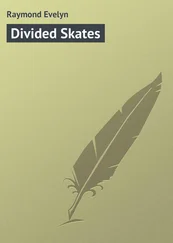Mike Lawson - House Divided
Здесь есть возможность читать онлайн «Mike Lawson - House Divided» весь текст электронной книги совершенно бесплатно (целиком полную версию без сокращений). В некоторых случаях можно слушать аудио, скачать через торрент в формате fb2 и присутствует краткое содержание. Жанр: Триллер, на английском языке. Описание произведения, (предисловие) а так же отзывы посетителей доступны на портале библиотеки ЛибКат.
- Название:House Divided
- Автор:
- Жанр:
- Год:неизвестен
- ISBN:нет данных
- Рейтинг книги:3 / 5. Голосов: 1
-
Избранное:Добавить в избранное
- Отзывы:
-
Ваша оценка:
- 60
- 1
- 2
- 3
- 4
- 5
House Divided: краткое содержание, описание и аннотация
Предлагаем к чтению аннотацию, описание, краткое содержание или предисловие (зависит от того, что написал сам автор книги «House Divided»). Если вы не нашли необходимую информацию о книге — напишите в комментариях, мы постараемся отыскать её.
House Divided — читать онлайн бесплатно полную книгу (весь текст) целиком
Ниже представлен текст книги, разбитый по страницам. Система сохранения места последней прочитанной страницы, позволяет с удобством читать онлайн бесплатно книгу «House Divided», без необходимости каждый раз заново искать на чём Вы остановились. Поставьте закладку, и сможете в любой момент перейти на страницу, на которой закончили чтение.
Интервал:
Закладка:
Not present in the room, but appearing on a video screen, was the American general who had overall command in Afghanistan, and the purpose of the meeting was to discuss the status of the war, which wasn’t going well at all. Bradford believed the reason the war was taking so long and costing so many American lives was because the president was too concerned about public opinion polls and placating our so-called ally, the Pakistanis. If Bradford had been given a free hand, he would have sent in thirty thousand more troops, pushed directly into Pakistan, dropped bunker busters on every cave in the region, and disarmed the entire population.
Forty minutes later-and after no decisions of any magnitude had been made-the president was ready to adjourn the meeting. But at that point, Clark Palmer, the deputy national security advisor, said, “Mr. President, there’s one other issue.”
The president looked at his watch. “What is it?”
“It’s something the NSA brought to my attention a couple of days ago. Admiral Wilcox, if you wouldn’t mind,” Clark said, nodding to the NSA director.
Admiral Wilcox was a short, slim, perpetually frowning man with iron-gray hair. He quickly explained that the NSA had intercepted a phone call between an opium warlord in Afghanistan named Sayed Wafa and one of his underlings discussing the elimination of a provincial governor whose province bordered Pakistan.
As Bradford listened to Wilcox, his knuckles turned white gripping the edge of the conference table. He couldn’t believe Wilcox had spoken to the White House about the situation before he had consulted with Bradford.
“Admiral, are you positive he was talking about assassinating Governor Falah?” the president asked.
Wilcox turned to his man Dillon Crane, and Crane said, “We’re as positive as we can be, Mr. President. It was a very short conversation and there’s always a risk in translation, but three of our best translators have listened to the intercept. And our conclusion is consistent with other intelligence acquired by Director Mentor’s people.”
The president now looked over at the CIA director. The man was reported to be brilliant, but Bradford found him physically disgusting. He was grossly overweight, his face was always shiny with perspiration, and his clothes looked as if he’d slept in them. Bradford had liked Mentor’s predecessor a lot better, a man named Jake LaFountaine, but LaFountaine had resigned unexpectedly earlier in the year.
“Admiral Wilcox is correct, sir,” Mentor said. “One of our assets has confirmed that Wafa wants the governor out of power.” When the president didn’t say anything, Mentor continued. “Our problem with Governor Falah is that he’s afraid to take on the Taliban and has become an actual hindrance to military operations in his province. If Wafa replaces him, which is quite likely, he’ll be much more inclined to support our objectives in the region. All he cares about is money.”
“But he grows opium,” the president said.
“Yes, sir,” Mentor said.
The issue now hanging over the conference table like a noxious cloud was should the U.S. government warn Governor Falah that Wafa was trying to assassinate him or should they allow the assassination to take place, giving them a chance to put a more malleable person in power. Bradford could tell that the president was furious to be put in the position of having to decide this matter, and Bradford didn’t blame him. It wasn’t as if Falah was the president of the country; he was a relatively minor politician and a bad one, at that. After this meeting was over, Bradford was going to chew out Wilcox like he was a boot camp seaman instead of a three-star admiral.
Wilcox knew that the right thing to do was to let Wafa kill the governor, and he should never have brought this issue to the president’s staff. The problem with Wilcox, though, was that he was a damn three-star Boy Scout. If he was given a lawful order to nuke Australia, he’d execute it without hesitation, but if he had to do something that was morally ambiguous-on the difficult-to-interpret fringe of the law-he was unwilling to shoulder the burden unilaterally even when he knew the outcome was in the country’s best interest.
It was because of men like Fenton Wilcox that Charles Bradford employed John Levy.
Before the president could commit himself, Bradford said, “Admiral, could you please repeat what Wafa said on that intercept?” After Wilcox had done so, Bradford said, “Mr. President, I don’t think you should decide anything at this time. One interpretation of that phone call is that Wafa is planning to kill Falah. But another interpretation could be-well, let me put it this way. The other day I was talking to a friend about something my wife did, and I said, ‘I could just strangle that woman.’ I suppose that could be interpreted as a legitimate threat on her life, but in reality I was just venting my frustration.”
Bradford noticed Dillon Crane smiling slightly, and he figured this was because Crane was bright enough to know what Bradford was doing: giving the president a way out. Wilcox opened his mouth to object to Bradford’s last statement, but before he could, the president said, “What do you recommend, General?”
“I recommend that we continue to monitor Mr. Wafa’s actions and communications for just a bit longer.”
Long enough, in other words, to give Wafa a chance to blow Falah to kingdom come with a roadside bomb.
Bradford could see that the president liked this answer because the burden of responsibility had now shifted to Bradford. If Falah was killed, and if the subject of this meeting ever became public knowledge-which was extremely unlikely-the president would be able to say he had been relying on the judgment of his military advisors, and they had advised him badly. Before the president even had a chance to say anything else, Bradford said, “Well, okay,” in an I’m-glad-that’s-settled tone, and then, to change the subject, he turned to the CIA director. “Sam, I saw something in yesterday’s briefing package about the Chinese upgrading their submarine sonar equipment. After the president leaves, maybe you could tell us all a little more about that.”
Bradford returned to the Pentagon still annoyed by the meeting at the White House. He was so damn tired of it: inexperienced, gutless civilians meddling in military matters; a Congress that delighted in making him beg for money and men; a Secretary of Defense who cared more about awarding contracts to his cronies than he did about the quality of the equipment they were buying. The only people he had any respect for were those like himself: men who had given their blood-and too often their lives-to defend this country. Men like Martin Breed.
He spent the next half hour in his office editing the eulogy he would deliver at Martin’s funeral. It was a good speech. It gave Martin the tribute he deserved and paid homage to the man he had been. It praised him without exaggerating in any way his dedication, his love of country, his boundless patriotism.
His only regret was that he could only speak to Martin’s public record.
He couldn’t talk about the truly great things Martin had done.
9
A man and a woman, both dressed in blue scrubs, approached the main doors of the hospital. They were chatting with each other, the woman laughing at something the man had said, then punching him lightly on the arm as if he was teasing her. The man was white and slender, about five foot eight. He had curly dark hair, a thin mustache, and a small goatee. He thought he looked like Johnny Depp. He didn’t. The woman was black, a bit shorter than the man, stocky, her dark hair streaked with blond highlights. She wore large framed glasses, what she called her Elton Johns.
Читать дальшеИнтервал:
Закладка:
Похожие книги на «House Divided»
Представляем Вашему вниманию похожие книги на «House Divided» списком для выбора. Мы отобрали схожую по названию и смыслу литературу в надежде предоставить читателям больше вариантов отыскать новые, интересные, ещё непрочитанные произведения.
Обсуждение, отзывы о книге «House Divided» и просто собственные мнения читателей. Оставьте ваши комментарии, напишите, что Вы думаете о произведении, его смысле или главных героях. Укажите что конкретно понравилось, а что нет, и почему Вы так считаете.
